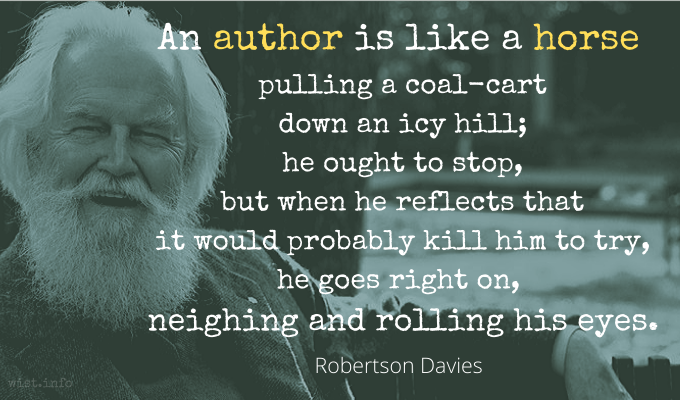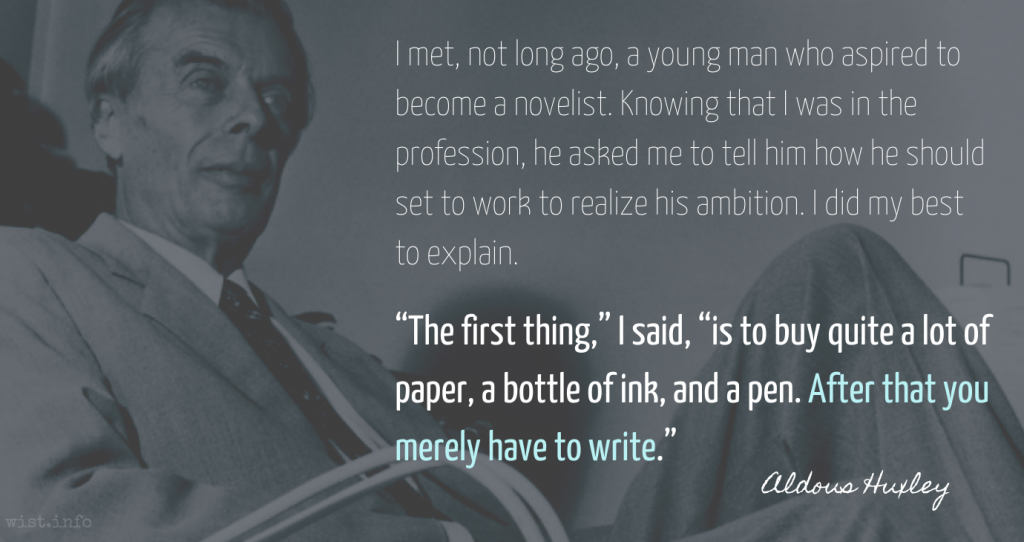Yes, I am personally the victim of deferred dreams, of blasted hopes, but in spite of that I close today by saying I still have a dream, because, you know, you can’t give up in life. If you lose hope, somehow you lose the vitality that keeps life moving, you lose that courage to be, that quality that helps you go on in spite of it all. And so today I still have a dream.
Martin Luther King, Jr. (1929-1968) American clergyman, civil rights leader, social activist, preacher
“A Christmas Sermon on Peace,” Ebenezer Baptist Church, Atlanta (1967-12-24)
(Source)
Broadcast by CBC Radio as the final of King's Massey Lectures, "Conscience for Change." Collected in Conscience for Change, republished after his assassination as The Trumpet of Conscience (1968).
Quotations about:
persistence
Note not all quotations have been tagged, so Search may find additional quotes on this topic.
It is a piece of idle sentimentality that truth, merely as truth, has any inherent power denied to error, of prevailing against the dungeon and the stake. Men are not more zealous for truth than they often are for error, and a sufficient application of legal or even of social penalties will generally succeed in stopping the propagation of either. The real advantage which truth has, consists in this, that when an opinion is true, it may be extinguished once, twice, or many times, but in the course of ages there will generally be found persons to rediscover it, until some one of its reappearances falls on a time when from favourable circumstances it escapes persecution until it has made such head as to withstand all subsequent attempts to suppress it.
It [political opposition] is like dancing with a bear. When you’re dancing with a bear, you can’t get tired and sit down. You have to wait for the bear to get tired.
Joycelyn Elders (b. 1933) American pediatrician, public health administrator, academic
Keynote Speech, Sistersong Conference, Chicago (2007-06-03)
(Source)
Nothing endures unless it has first been transposed into a myth, and the great advantage of myths is that they are ladies with portable roots.
Success is going from failure to failure without losing your enthusiasm.
Winston Churchill (1874-1965) British statesman and author
(Spurious)
Widely attributed to Churchill, but not found in his writings or contemporary reports of his speech. It's also attributed to Abraham Lincoln, with similar lack of provenance.
Variants:More information about this quotation:
- "Success is the ability to move from one failure to another without loss of enthusiasm."
- "Courage is going from failure to failure without losing enthusiasm."
- "To succeed is to fail repeatedly, but without losing enthusiasm."
Therefore, rise. Force your breath, restore it
By that spirit which wins in every battle it fights,
Unless the beaten body says, “no more!”[E però leva sù; vinci l’ambascia
l’animo che vince ogne battaglia,
col suo grave corpo non s’accascia.]Dante Alighieri (1265-1321) Italian poet
The Divine Comedy [Divina Commedia], Book 1 “Inferno,” Canto 24, l. 52ff (24.52-54) [Virgil] (1309) [tr. Raffel (2010)]
(Source)
(Source (Italian)). Alternate translations:
Therefore rise up; your breathing short o'ercome
With Courage, for it ev'ry battle wins;
Unless your heavy limbs submit to sloth.
[tr. Rogers (1782)]
Arise!-- It ill befits the mounting mind
With mortal cares debas'd, to lag behind.
[tr. Boyd (1802)]
Thou therefore rise: vanish thy weariness
By the mind’s effort, in each struggle form’d
To vanquish, if she suffer not the weight
Of her corporeal frame to crush her down.
[tr. Cary (1814)]
Up then; o'ercome thy breathlessness by mind;
To win the battle mind shall never fail.
If by her own dull body's weight declined
She faint not.
[tr. Dayman (1843)]
And therefore rise! conquer thy panting with the soul, that conquers every battle, if with its heavy body it sinks not down.
[tr. Carlyle (1849)]
Then rouse thyself and conquer thy fatigue,
With mind victorious in every battle,
Unless the dull frame subdue its mettle.
[tr. Bannerman (1850)]
Up, up, then, up! conquer thy suff'ring breath,
That courage rouse which ev'ry battle wins,
If not kept down by the too-heavy flesh.
[tr. Johnston (1867)]
And therefore raise thee up, o'ercome the anguish
With spirit that o'ercometh every battle,
If with its heavy body it sink not.
[tr. Longfellow (1867)]
And therefore lift up, conquer the task with the mind that wins every battle, if with its heavy jody it throw not itself down.
[tr. Butler (1885)]
Therefore arise, thy weakness stem with worth
Of soul, that of all battles wins the prime,
Unless 'tis borne down by the body's dearth.
[tr. Minchin (1885)]
And therefore rise up, conquer the exhaustion with the spirit that conquers every battle, if by its heavy body it be not dragged down.
[tr. Norton (1892)]
Wherefore bestir thyself; conquer thy weariness with the courageous soul that conquereth in every fight, if it so be that it is not dragged down by the body's weight.
[tr. Sullivan (1893)]
And so do thou rise up, conquer the shortness
Of breath with spirit that wins every battle.
If with its heavy body it does not totter.
[tr. Griffith (1908)]
Rise, therefore, conquer thy panting with the soul, which conquers in every battle if it sink not with its body's weight.
[tr. Sinclair (1939)]
And therefore rise! Quell now thy panting breast
With the soul's strength that winneth every fight,
So it be not by the body's weight deprest.
[tr. Binyon (1943)]
Rise up; control thy panting breath, and call
The soul to aid, that wins in every fight,
Save the dull flesh should drag it to a fall.
[tr. Sayers (1949)]
Now, therefore, rise. Control your breath, and call
upon the strength of soul that wins all battles
unless it sink in the gross body's fall.
[tr. Ciardi (1954)]
Rise, therefore; conquer your panting with the soul that vvins every battle, if with its heavy body it sinks not down.
[tr. Singleton (1970)]
Stand up! Dominate this weariness of yours
with the strength of soul that wins in every battle
if it does not sink beneath the body's weight.
[tr. Musa (1971)]
Therefore, get up; defeat your breathlessness
with spirit that can win all battles if
the body’s heaviness does not deter it.
[tr. Mandelbaum (1980)]
Therefore get up: control your breathlessness
By force of mind, which wins in every battle,
If with its heavy body it does not sink.
[tr. Sisson (1981)]
So stand
And overcome your panting -- with the soul
Which wins all battles if it does not despond
Under its heavy body's weight.
[tr. Pinsky (1994), l. 52ff]
And therefore stand up; conquer your panting with the spirit that conquers in every battle, if it does not let the heavy body crush it down.
[tr. Durling (1996)]
So rise, and overcome weariness with spirit, that wins every battle, if it does not lie down with the gross body.
[tr. Kline (2002)]
Get up! breathe with the soul, for it is brave
in every battle, and will always win,
unless the heavy body be its grave.
[tr. Carson (2002)]
So upwards! On! And vanquish labored breath!
In any battle mind-power will prevail,
unless the weight of body loads it down.
[tr. Kirkpatrick (2006)]
Get to your feet! Conquer this laboring breath
with strength of mind, which wins the battle
if not dragged down by body's weight.
[tr. Hollander/Hollander (2007)]
Therefore arise, with your soul’s flag unfurled
Above your fear, for so your soul prevails
In every battle if the body's weight
Can't sink it.
[tr. James (2013)]
Character consists of what you do on the third and fourth tries.
Do not persist in folly. Some make a duty of failure and having started down the wrong road, think it a badge of character to continue.
[No proseguir la necedad. Hacen algunos empeño del desacierto, y porque comenzaron a errar, les parece que es constancia el proseguir.]
Baltasar Gracián y Morales (1601-1658) Spanish Jesuit priest, writer, philosopher
The Art of Worldly Wisdom [Oráculo Manual y Arte de Prudencia], § 261 (1647) [tr. Fischer (1937)]
(Source)
(Source (Spanish)). Alternate translations:
Not to continue a Foppery. Some make an engagement of their mistakes: when they have once begun to fail, they think they are concerned in honour to continue.
[Flesher ed. (1685)]
Do not follow up a Folly. Many make an obligation out of a blunder, and because they have entered the wrong path thinks it proves their strength of character to go in it.
[tr. Jacobs (1892)]
Don’t persist in folly. Some people commit themselves to their errors. They act mistakenly and consider it constancy to go on that way.
[tr. Maurer (1992)]
Yield not to evils, but the bolder thou
Persist, defiant of misfortune’s frown,
And take the path thy Destinies allow.[Tu ne cede malis, sed contra audentior ito
Quam tua te fortuna sinet.]Virgil (70-19 BC) Roman poet [b. Publius Vergilius Maro; also Vergil]
The Aeneid [Ænē̆is], Book 6, l. 95ff (6.95-96) [The Sybil] (29-19 BC) [tr. Taylor (1907), st. 15, ll. 12]
(Source)
Stoic maxim. There is argument as to whether it should be quam or qua, leading to some variations in translating the second half of the quotation.
(Source (Latin)). Alternate translations:
Yet dangers fear not, but on bolder goe,
What course thy fortune grants
[tr. Ogilby (1649)]
But thou, secure of soul, unbent with woes,
The more thy fortune frowns, the more oppose.
[tr. Dryden (1697)]
Yield not under your sufferings, but encounter them with greater boldness than your fortune shall permit.
[tr. Davidson/Buckley (1854)]
Yet still despond not, but proceed
Along the path where Fate may lead.
[tr. Conington (1866)]
Yet yield not thou, but go more boldly on,
Where Fortune leads, till victory be won.
[tr. Cranch (1872), ll. 121-122]
Yield not thou to distresses, but all the bolder go forth to meet them, as thy fortune shall allow thee way.
[tr. Mackail (1885)]
But thou, yield not to any ill, but set thy face, and wend
The bolder where thy fortune leads.
[tr. Morris (1900)]
Oh! yield not to thy woe, but front it ever,
And follow boldly whither Fortune calls.
[tr. Williams (1910)]
Yield not thou to ills, but go forth to face them more boldly than thy Fortune shall allow thee!
[tr. Fairclough (1916)]
Do not yield to evil,
Attack, attack, more boldly even than fortune
Seems to permit.
[tr. Humphries (1951)]
But never give way to those evils: face them all the more boldly,
Using what methods your luck allows you.
[tr. Day-Lewis (1952)]
Do not relent before distress, but be
far bolder than your fortune would permit.
[tr. Mandelbaum (1971), ll. 132-33]
Never shrink from blows.
Boldly, more boldly where your luck allows,
Go forward, face them.
[tr. Fitzgerald (1981), ll. 143-45]
You must not give way to these adversities but must face them all the more boldly wherever your fortune allows it.
[tr. West (1990)]
Do not give way to misfortunes, meet them more bravely,
as your destiny allows.
[tr. Kline (2002)]
Do not yield, but oppose your troubles
All the more boldly, as far as your fate
And fortune allow.
[tr. Lombardo (2005)]
But never bow to suffering, go and face it,
all the bolder, wherever Fortune clears the way.
[tr. Fagles (2006), ll. 113-14]
Don’t yield to evils, but go boldly forward
Where your fortune bids you.
[tr. @sentantiq (2018)]
Don't give up at these misfortunes. Be as brave as Fortune lets you.
[tr. Bartsch (2021)]
Time has a way of demonstrating
The most stubborn are the most intelligent.Yevgeny Yevtushenko (1933-2017) Russian poet, writer, film director, academic [Евге́ний Евтуше́нко, Evgenij Evtušenko]
“A Career” (1957)
(Source)
Do not get lost in a sea of despair. You must not become bitter or hostile; be hopeful and optimistic. Our struggle is not the struggle of a day, a week, a month, or a year. It is the struggle of a lifetime. Never, ever be afraid to make some noise and get in good trouble, necessary trouble. We will find a way to make a way out of no way.
John Lewis (1940-2020) American politician and civil rights leader
Stump speech
Lewis used variations of these phrases regularly through his career. Several abridged combinations showed up in social media:
Ours is not the struggle of a day, a week, a month, or a year--it is the struggle of lifetime. We must build a world at peace with itself.
[Twitter (14 Jul 2016)]
Do not get lost in a sea of despair. Be hopeful, be optimistic. Our struggle is not the struggle of a day, a week, a month, or a year, it is the struggle of a lifetime. Never, ever be afraid to make some noise and get in good trouble, necessary trouble.
[Twitter (27 Jun 2018)]
Do not get lost in a sea of despair. Do not become bitter or hostile. Be hopeful, be optimistic. Never, ever be afraid to make some noise and get in good trouble, necessary trouble. We will find a way to make a way out of no way.
[Twitter (16 Jul 2019)]
There must be a beginning of any great matter, but the continuing unto the end until it be thoroughly finished yields the true glory.
Francis Drake (c. 1540-1596) English explorer, sea captain, politician
Letter to Francis Walsingham, from Sagres, Portugal (17 May 1587)
(Source)
The uncommitted life is not worth living. We either believe in something or we don’t. Commitment is willingness to stand up and be counted. It is a human must — for young and old, for black and white, for Christian, Moslem and Buddhist. It is skill plus good will. It is a thoughtful decision on the part of an individual to participate passionately in the events of his time. It is the dogged staying-power coupled with the sensible idealism that makes the word go ’round.
The only kind of courage that matters is the kind that gets you from one moment to the next.
Mignon McLaughlin (1913-1983) American journalist and author
The Second Neurotic’s Notebook, ch. 4 (1966)
(Source)
sometimes you climb out of bed in the morning and you think,
I’m not going to make it, but you laugh inside
remembering all the times you’ve felt that wayCharles Bukowski (1920-1994) German-American author, poet
“Gamblers All” (1990)
(Source)
Originally titled "8 Count and Up".
Three Failures denote uncommon strength. A weakling has not enough grit to fail thrice.
Minna Antrim (1861-1950) American epigrammatist, writer
At the Sign of the Golden Calf (1905)
(Source)
It is only an error of judgment to make a mistake, but it argues an infirmity of character to adhere to it when discovered.
Christian Nestell Bovee (1820-1904) American epigrammatist, writer, publisher
Intuitions and Summaries of Thought, Vol. 2 (1862)
(Source)
Grief is the agony of an instant; the indulgence of Grief the blunder of a life.
Benjamin Disraeli (1804-1881) English politician and author
Vivian Grey, Book 6, ch. 7 (1826)
(Source)
what matters most is
how well you
walk through the
fire.
We will match your capacity to inflict suffering by our capacity to endure suffering. We will meet your physical force with soul force. Do to us what you will, and we will still love you. We cannot in all good conscience obey your unjust laws because non-cooperation with evil is as much a moral obligation as is cooperation with good. And so put us in jail, and we will go in with humble smiles on our faces, still loving you. Bomb our homes and threaten our children, and we will still love you. Send your propaganda agents around the country and make it appear that we are not fit morally, culturally, and otherwise for integration. And we will still love you. Send your hooded perpetrators of violence into our communities at the midnight hours, and drag us out on some wayside road and beat us and leave us half dead, and we will still love you. But be assured that we will wear you down by our capacity to suffer.
And one day we will win our freedom, but not only will we win freedom for ourselves, we will so appeal to your heart and conscience that we will win you in the process. And our victory will be a double victory.
Martin Luther King, Jr. (1929-1968) American clergyman, civil rights leader, social activist, preacher
“Loving Your Enemies,” sermon, Detroit Council of Churches Noon Lenten Services (1961-03-07)
(Source)
Reprinted in edited form in King, Strength to Love, ch. 5 "Loving Your Enemies," sec. 2 (1963). In the preface he notes this sermon was originally written while in jail in Georgia.
See Gandhi.
If you live long enough, you’ll make mistakes. But if you learn from them, you’ll be a better person. It’s how you handle adversity, not how it affects you. The main thing is never quit, never quit, never quit.
Calumny is like a wasp which harasses you. Raise no hand against it unless you’re sure of killing it, for otherwise it will return to the charge more furious than ever.
[La calomnie est comme la guêpe qui vous importune, et contre laquelle il ne faut faire aucun mouvement, à moins qu’on ne soit sûr de la tuer, sans quoi elle revient à la charge, plus furieuse que jamais.]
Nicolas Chamfort (1741-1794) French writer, epigrammist (b. Nicolas-Sébastien Roch)
Products of Perfected Civilization [Produits de la Civilisation Perfectionée], Part 1 “Maxims and Thoughts [Maximes et Pensées],” ch. 5, ¶ 302 (1795) [tr. Dusinberre (1992)]
(Source)
(Source (French)). Alternate translations:
Calumny is like the wasp which worries you, which it were best not to try to get rid of unless you are sure of slaying it; for otherwise it will return to the charge more furious than ever.
[Source (1872)]
Scandal is an importunate wasp, against which we must make no movement unless we are quite sure that we can kill it; otherwise it will return to the attack more furious than ever.
[tr. Mathers (1926)]
Calumny is like some annoying wasp, against which one must make no move unless one is sure of killing it, or else it will return to the charge more furiously than ever.
[tr. Merwin (1969)]
Calumny is a wasp that bothers you, and against which you mustn't make any movement unless you are sure to kill it; otherwise it will attack you more furiously than before.
[tr. Siniscalchi (1994)]
Slander is like a wasp which is pestering you but which you mustn't take any action against unless he happens to turn round.
[tr. Parmée (2003), ¶ 182]
One word after another.
That’s the only way that novels get written and, short of elves coming in the night and turning your jumbled notes into Chapter Nine, it’s the only way to do it.
So keep on keeping on. Write another word and then another.Neil Gaiman (b. 1960) British author, screenwriter, fabulist
“Pep Talk from Neil Gaiman,” National Novel Writing Month (2011)
(Source)
My dad had once told me that the secret to a happy life was never to start something with a girl unless you were willing to follow wherever it leads. It’s the best piece of advice he’s ever given me and probably the reason I was born.
What nobody tells people who are beginners, and I really wish someone had told this to me, is that […] all of us who do creative work, we get into it, and we get into because we have good taste. […] But you get into this thing […] and there’s a gap. For the first couple of years that you’re making stuff, what you’re making isn’t so good. It’s not that great. It’s really not that great. It’s trying to be good, it has ambition to be good, but it’s not quite that good. But your taste, the thing that got you into the game, your taste is still killer. And your taste is good enough that you can tell that what you’re making is kind of a disappointment to you. That you can tell it’s still sort of crappy. A lot of people never get past that phase. A lot of people at that point, they quit. […] The thing I want to tell you is, everybody goes through that. […] It’s totally normal. And the most important possible thing you can do is do a lot of work. Do a huge volume of work. Put yourself on a deadline so that every week or every month you know you’re going to finish one story. […] Because it’s only by actually going through a volume of work that you’re going to catch up and close that gap. And the work you’re making will be as good as your ambitions. […] It’s going to take you awhile. It’s normal to take a while. You just have to fight your way through that.
Ira Glass (b. 1959) American report, radio personality, producer
“This American Life,” Public Radio International (Aug 2009)
(Source)
Teach us, good Lord, to serve you as you deserve; to give and not to count the cost; to fight and not to heed the wounds; to toil and not to seek for rest; to labor and not to ask for any reward, save that of knowing that we do your will.
You see, fellow-soldiers, that perseverance is more prevailing than violence, and that many things which cannot be overcome when they are together, yield themselves up when taken little by little.
Quintus Sertorius (c. 123-72 BC) Roman statesman and general
In Plutarch, Parallel Lives, “Sertorius,” sec. 16 [Dryden ed. (1693)]
(Source)
Alt. trans.: "You see, fellow-soldiers, that perseverance is worth more than energy, and that many things that cannot be overcome when they are together, yield themselves up when taken little by little."
The main idea in golf as in life, I suppose, is to learn to accept what cannot be altered, and to keep on doing one’s own reasoned and resolute best whether the prospect be bleak or rosy.
Robert Tyre "Bobby" Jones, Jr. (1902-1971) American amateur golfer, lawyer
Golf Is My Game (1960)
(Source)
Keep on going, and chances are you will stumble on something, perhaps when you are least expecting it. I never heard of anyone stumbling on something sitting down.
Charles F. Kettering (1876-1958) American inventor, engineer, researcher, businessman
(Attributed)
Variant:
"Keep on going and the chances are you will stumble on something, perhaps when you are least expecting it. I have never heard of anyone stumbling on something sitting down."
I am unable to find this precise phrase in Kettering's writings or primary writings about him. However, this appears to have been part of a common set of phrases he used, which indicates either it is accurate or a paraphrase of one of them:
Accomplishment has been an accident as a rule. Nobody ever stumbled while he was standing still. You only stumble when you are moving. So we always had it a rule in our organization when we lacked intelligence we speeded up motion, because the chances of stumbling infinitely increased.
"250 at Luncheon Honor Kettering," New York Times (1936-11-11)
Nobody ever found anything while sitting down. So, Q.E.D., don't be afraid to stumble.
“Don’t Be Afraid to Stumble,” The Rotarian (1952-01)
[I]t was followed by a long scream of rage mixed with a roar of complaint: “AAaargwannawannaaaagongongonaargggaaaaBLOON!” which is the traditional sound of a very small child learning that with balloons, as with life itself, it is important to know when not to let go of the string. The whole point of balloons is to teach small children this.
Terry Pratchett (1948-2015) English author
A Hat Full of Sky, ch. 11 “Arthur” (2004)
(Source)
This is apparently the origin of the much more frequently found paraphrase:
There are times in life when people must know when not to let go. Balloons are designed to teach small children this.
This shorter form has been used, among other places, in a Change.org petition to Death to reinstate Pratchett after the author's passing. It is possible Pratchett may have used it somewhere else, but I am unable to find it (it does not show up in the alt.fan.pratchett board in any message from him).
See also Cox.
However highly we must value courage and steadfastness in war, and however little prospect of victory there is for him who cannot resolve to seek it by the exertion of all his strength, still there is a point beyond which perseverance can only be called desperate folly, and therefore cannot be approved by any critic.
[Wie hoch auch der Wert des Mutes und der Standhaftigkeit im Kriege angeschlagen werden muß, und wie wenig Aussicht der zum Siege hat, der sich nicht entschließen kann, ihn mit der ganzen Kraftanstrengung zu suchen, so gibt es doch einen Punkt, über den hinaus das Verharren nur eine verzweiflungsvolle Torheit genannt und also von keiner Kritik gebilligt werden kann.]
Karl von Clausewitz (1780-1831) Prussian soldier, historian, military theorist
On War [Vom Kriege], Book 4, ch. 9 “The Battle: Its Decision [Die Hauptschlacht. Ihre Entscheidung],” (4.9) (1832) [tr. Jolles (1943)]
(Source)
(Source (German)). Alternate translations:
However highly we must esteem courage and firmness in war, and however little prospect there is of victory to him who cannot resolve to seek it by the exertion of all his power, still there is a point beyond which perseverance can only be termed desperate folly, and therefore can meet with no approbation from any critic.
[tr. Graham (1873)]
No matter how highly rated the qualities of courage and steadfastness may be in war, no matter how small the chance of victory may be for the leader who hesitates to go for it with all the power at his disposal, there is a point beyond which persistence becomes desperate folly, and can therefore never be condoned.
[tr. Howard & Paret (1976)]
‘Tis Perseverance that prevails.
Thomas Fuller (1654-1734) English physician, preacher, aphorist, writer
Gnomologia: Adages and Proverbs, #5110 (1732)
(Source)
Every great improvement has come after repeated failures. Virtually nothing comes out right the first time. Failures, repeated failures, are finger posts on the road to achievement. One fails forward toward success.
Charles F. Kettering (1876-1958) American inventor, engineer, researcher, businessman
(Attributed)
(Source)
The drops of rain make a hole in the stone, not by violence, but by oft falling.
[Gutta cavat lapidem, non vi, sed saepe cadendo.]
(Other Authors and Sources)
Latin proverb
Alt. trans.:
- "The rain dints the hard stone, not by violence, but by oft-falling drops."
- "The drop of rain maketh a hole in the stone, not by violence, but by oft falling."
- "The drop hollows out the stone not by strength, but by constant falling."
- "The drop hollows the stone, not with force but by falling often."
- "Dripping water hollows out the stone not by force, but by continually falling."
Some famous usages include Lucretius, De rerum natura, Book 6, l. 312: "The ring on the finger is tapered by being worn, the dripping water hollows out the stone, the plow is subtly worn by the impact of the fields." [anulus in digito subter tenuatur habendo, stilicidi casus lapidem cavat, uncus aratri, ferreus occulte decrescit vomer in arvis]
Similarly Ovid, Ex Ponte, 4.10.5: "The drop hollows out the stone, the ring is worn by use, and the curved ploughshare is rubbed away by the pressure of the earth." [Gutta cavat lapidem, consumitur annulus usu, et teritur pressa vomer aduncus humo.]
Made famous in English by Hugh Latimer, "Seventh Sermon before Edward VI" (1549). Similarly, John Lyly, Euphues (1580): "The soft droppes of rain perce the hard marble; many strokes overthrow the tallest oaks."
I think the most important thing I learned from Stephen King I learned as a teenager, reading King’s book of essays on horror and on writing, Danse Macabre. In there he points out that if you just write a page a day, just 300 words, at the end of a year you’d have a novel. It was immensely reassuring — suddenly something huge and impossible became strangely easy. As an adult, it’s how I’ve written books I haven’t had the time to write, like my children’s novel Coraline.
Neil Gaiman (b. 1960) British author, screenwriter, fabulist
Blog entry (2012-04-28), “Popular Writers: A Stephen King Interview”
(Source)
Contributor's note to an interview with Stephen King, "The King and I," Sunday Times Magazine (2012-04-08).
I met, not long ago, a young man who aspired to become a novelist. Knowing that I was in the profession, he asked me to tell him how he should set to work to realize his ambition. I did my best to explain. “The first thing,” I said, “is to buy quite a lot of paper, a bottle of ink, and a pen. After that you merely have to write.”
Aldous Huxley (1894-1963) English novelist, essayist and critic
“Sermons in Cats,” Music at Night and Other Essays (1931)
(Source)
If there is such a thing as luck, then I must be the most unlucky fellow in the world. I’ve never once made a lucky strike in all my life. When I get after something I need, I start finding everything in the world I don’t need — one damn thing after another. I find ninety-nine things I don’t need, and then comes number one hundred , and that — at the very last — turns out to be just what I had been looking for.
The greatest of human problems, and the greatest of our common tasks, is to keep the peace and to save the future. All that we have built in the wealth of nations, and all that we plan to do toward a better life for all, will be in vain if our feet should slip, or our vision falter, and our hopes ended in another worldwide war. If there is one commitment more than any other that I would like to leave with you today, it is my unswerving commitment to the keeping and to the strengthening of the peace. Peace is a journey of a thousand miles and it must be taken one step at a time.
Lyndon B. Johnson (1908-1973) American politician, educator, US President (1963-69)
Speech (1963-12-17), United Nations General Assembly
(Source)
John Kennedy had used the same "journey" phrase from Lao-tzu early that year, before his assassination.
These are the times that try men’s souls. The summer soldier and the sunshine patriot will, in this crisis, shrink from the service of their country; but he that stands it now, deserves the love and thanks of man and woman.
Our greatest glory is, not in never falling, but in rising every time we fall.
Oliver Goldsmith (1730-1774) Irish poet, playwright, novelist
The Citizen of the World: or, Letters from a Chinese Philosopher, Residing in London, to His Friends in the East, Letter 7 (1762)
(Source)
Ostensibly from a Chinese visitor to London, Lien Chi Altangi, the letters were written by Goldsmith and published in The Public Ledger in 1760-61. Letter 22 has the similar "True magnanimity consists not in NEVER falling, but in RISING every time we fall."
The saying is often attributed to Confucius (Letter 7's introduction implied that they were), but is not found in Confucius' work. The saying is also sometimes attributed to Ralph Waldo Emerson. See here for more discussion.
Speaking of Yen Hui, the Master said: “How sad — to watch him forge ahead so resolutely, and never see how far he could go.”
[子謂顏淵曰、惜乎、吾見其進也、未見其止也。]
Confucius (c. 551- c. 479 BC) Chinese philosopher, sage, politician [孔夫子 (Kǒng Fūzǐ, K'ung Fu-tzu, K'ung Fu Tse), 孔子 (Kǒngzǐ, Chungni), 孔丘 (Kǒng Qiū, K'ung Ch'iu)]
The Analects [論語, 论语, Lúnyǔ], Book 9, verse 21 (9.21) (6th C. BC – AD 3rd C.) [tr. Hinton (1998)]
(Source)
Regarding his finest student, who died young. Probable origin of a phrase frequently attributed to Confucius: "It does not matter how slowly you go so long as you do not stop."
Earlier sources use Legge's numbering of 9.20, as noted. (Source (Chinese)). Alternate translations:
The Master said of Yen Yuan, "Alas! I saw his constant advance. I never saw him stop in his progress."
[tr. Legge (1861), 9.20]
"Alas for Hwúi! I saw him (ever) making progress. I never saw him stopping short."
[tr. Jennings (1895), 9.20]
Confucius remarked of the same disciple [Yen Hui]: "Alas! he is dead. I have observed his constant advance; I never saw him stop in his progress."
[tr. Ku Hung-Ming (1898), 9.20]
The Master, referring to Yen Yüan, said: "Alas! I ever saw him make progress, and never saw him stand still."
[tr. Soothill (1910), 9.20]
He described Yen Yuan: Alas, I see him advance, I never see him stop (take a position).
[tr. Pound (1933), 9.20]
The Master said of Yen Hui, Alas, I saw him go forward, but had no chance to see whither this progress would have led him in the end.
[tr. Waley (1938), 9.20]
What a pity that Yen Hui is gone! I saw him make progress, but I never found out what his limit was.
[tr. Ware (1950)]
Alas! I only saw him advance and never saw him stop.
[tr. Huang (1997)]
The Master said of Yen Yūan, "I watched him making progress, but I did not see him realize his capacity to the full. What a pity!"
[tr. Lau (1979)]
The master said of Yan Hui: "Alas! I saw that he was making progress, but I never saw that he was stopping."
[tr. Dawson (1993)]
The Master said of Yan Hui: "Alas, I watched his progress, but did not see him reach the goal."
[tr. Leys (1997)]
The master, speaking of Yan Yuan, said: "Alas! I only saw him advance and never saw him stop."
[tr. Huang (1997)]
Confucius talked about Yuan Yan, said: "What regrettable it is! I just saw that he kept going ahead, and never saw that he got any stopping."
[tr. Cai/Yu (1998), #230]
The Master said about Yan Hui, "Such a pity! I only saw his progress; I never saw where he got to."
[tr. Ames/Rosemont (1998)]
The Master said of Yén Hwéi, Alas! I saw him start, but I did not see him finish.
[tr. Brooks/Brooks (1998)]
The Master said of Yan Hui, “Alas! I watched his advance, and never once saw him stop.”
[tr. Slingerland (2003)]
Speaking of Yan Yuan, the Master said, What a pity! I saw him move forward. I never saw him come to a stop.
[tr. Watson (2007)]
The Master, referring to Yan Hui, said, "It is a pity! I saw him moving forward but did not see him complete his journey."
[tr. Chin (2014)]
Confucius said of Yan Yuan, "Impressive indeed! I always see his progress and have never noticed his pause."
[tr. Li (2020)]
A hero is no braver than an ordinary man, but he is braver five minutes longer.
Ralph Waldo Emerson (1803-1882) American essayist, lecturer, poet
(Spurious)
Frequently ascribed to him, especially in recent decades, but not found in his works.
More discussion about this quotation:
All great masters are chiefly distinguished by the power of adding a second, a third, and perhaps a fourth step in a continuous line. Many a man had taken the first step. With every additional step you enhance immensely the value of your first.
Ralph Waldo Emerson (1803-1882) American essayist, lecturer, poet
“Powers and Laws of Thought,” Natural History of Intellect, Lecture 1, Harvard (1870, Spring)
(Source)
The baby rises to its feet, takes a step, is overcome with triumph and joy — and falls flat on its face. It is a pattern for all that is to come! But learn from the bewildered baby. Lurch to your feet again. You’ll make the sofa in the end.
Pamela Brown (1924-1989) British writer, actress, television producer
The Swish of the Curtain (1938)
















































